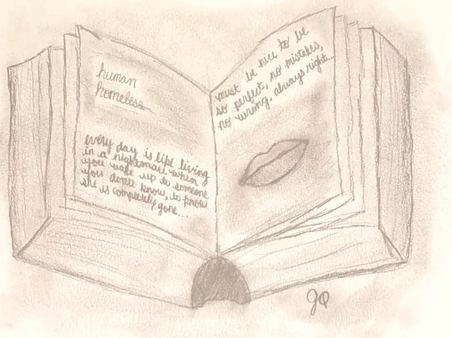 Emmie’s story comes to us from the parallels of her life on and off the streets and her ability to use poetry as an avenue for healing. A few weeks ago we sat down with Emmie to learn more about her story. She revealed some of her life experiences through childhood memories, her experience with homelessness, and a message of hope. She shared with us how it all began, “My dad went to prison when I was about six years old. My mom passed away in my arms when I was 12. Since I was born, my mom and my dad were both drug dealers. I've been in the drug game my whole life, that's the one thing that comes quicker to me than changing a baby's diaper. It's sad and I'm glad that it's kind of becoming dusty; I don't want it to get uncovered. After my mom died, until I was 13, I was living with a family member until they tried to molest me. I put myself into foster care and stayed there until I aged out. I was by myself and it's just been me, my whole life. I graduated TC for the first time in 2009 with a degree in Food Production Specialist. I started to go back in 2018, but for medical reasons I had to drop out. In between, I picked up misdemeanor and felony charges. I'm not happy about it, but I don't regret it either. I'm just thankful that I didn't lose myself. As of July 24th, I am off all papers [off probation]. I still call my probation officer. She has helped me the most in figuring out what works for me. She showed me different avenues that I wouldn't have ever tried if she didn't push me. Probation officers are realizing that jail is not treatment for us, drug users. No matter how long you put us in jail, we're going to come right back out and use drugs. She [my probation officer] kept her promises to me and that made me trust her a lot more. Growing up in foster care, I didn't like authority because they always lied to me. They always say that they're going to be there to help and then when you need them they're not there.”
Emmie’s experience with homelessness started several years ago, and she conveyed how she ended up on the streets in our community. “I became homeless in 2009. I left a bad relationship in Sparta and I walked from Sparta to La Crosse knowing I had nowhere to go. I knew I couldn't stay there anymore. From 2009 until last December when I got housed, I've done a lot. I went back to school for my second degree, but I wasn't able to continue with school because of medical issues. The majority of the time I was homeless I did have a job, but all of my money went straight to my kids. So my kids had roofs over their heads, but I didn't and it really sucked the majority of the time. That's the main factor for why I wouldn't go back to being homeless. I need my babies in my life. I have three kids. My first one passed away when he was a baby. I also have an eight year old and five year old. They are the reason that next April I will be six years clean and sober from heroin. Six years ago, I dropped right on the street. I didn't care that there was traffic coming. I had lost everything. I told the cops, ‘you guys cannot leave me, I'm going to go to the first dope house.’ They left without helping me.” We learned from Emmie how deep homelessness cuts, and how the struggles remain prevalent even after being housed. “No matter how much somebody changes, being homeless will stick to them no matter how hard they try to change. Right now I have a place, I've got a job, I'm not homeless, I'm not using drugs, but CPS (Child Protective Services) keeps telling me it's not good enough to have my kids back. So I think what am I doing? Why am I trying? Who am I doing this for? When you get labeled as being homeless, it does not change for anything. I can see both sides now. Once I got my job I decided that out of each paycheck, I'm taking $10 and getting socks, hygiene items, or whatever, so I can give to the homeless. I can never turn my back on them. I could never close the door on my homeless friends, I just couldn't. That means I'm being judgemental to myself.” Emmie shared words of inspiration and how she navigated her time on the streets, especially during the harsh Wisconsin winters. “While homeless, I needed to be thankful everyday, even though it was shitty, especially during the winter time. I was always happy because I was always thankful. I may have been sleeping on the cold ground, but at least I'm still here. Staying warm was one of my biggest challenges, even when I found one of those hidden entryways, that didn't mind people staying. I've also turned around and given my entrance away to an older person because their body needed it more than I did. I have a kind heart. I left the warming center before giving my seat up for an older person. Getting out of the wind was important. Being homeless in the winter time and having no knowledge of survival skills means you're not going to make it, not in Wisconsin. Having enough food was always a struggle, and I guess my appearance. Appearance to me is a big factor in life. For many, many years, nobody knew I was homeless, because I didn't look like it. People would say I never smelled or looked dirty. Just because I was homeless didn’t mean that picture of the typical homeless person, was who I should have been.” For Emmie, writing poetry allows her to process her thoughts, testify to others, and heal from her experiences. “I write about misery, any type of misery, from the misery of using drugs, to all the pain and suffering that I deal with inside, and misery of losing my mom. I started writing in 2016 and I finally wrote a poem for my mom. My uncle first convinced me to share my poems. The day that I decided to [share my poems] my uncle ended up getting rushed to the hospital. I went and performed three of my poems with my youngest boy. He knows everything about my poems. He has a copy of my poem book at his foster home right now. In 2017, I revealed three of my poems. In 2018, I became published in a book at UWL. In 2019, I was published on the wall at the Hospitality House. Now, I'm working on a whole book.” Emmie leaves us with a message of her beliefs on how tragedy can shape the human spirit. “I've gone through a lot of hell in my life, but I'm grateful for it all. I wouldn't be as strong as I am today without it. Life is hard, but it's manageable. You can get through it if you truly want to and if you don't, you know where you're going to stay, but don't complain about it and don’t lose your self respect. Self respect is super important. There's other people that lose it and don't have self respect anymore. That's one thing that the homeless should start gaining back. For people looking in, you can’t always look at the cover and know the details of what's inside. Take a moment and open it.” Artist’s Note: Emmie’s poetry is the highlight of the piece. Emmie mentioned the importance of getting to know a person and not judging a book by its cover. Labels can be defining, but only if we let them. Know the person, know the heart, and use your lips to speak kindness and love, always.
0 Comments
Leave a Reply. |
|
